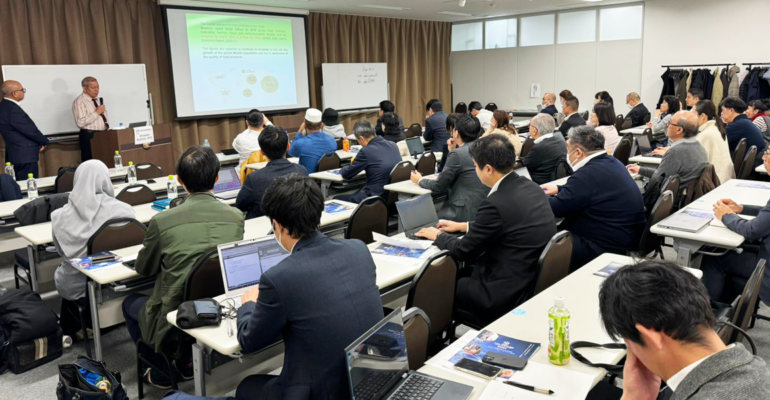Chairman of HSC IPB University Invited by Nippon Asia Halal Association, Promoting Halal in Japan

Nippon Asia Halal Association invited the Chairman of Halal Science Center (HSC) IPB University, Prof Khaswar Syamsu to promote halal and halal certification in the form of a seminar in front of Japanese entrepreneurs, (5/12) at Yaesu-dori Hata Building Tokyo, Japan.
Prof Khaswar Syamsu explained the meaning of halal products as well as regulations and procedures for obtaining halal certificates from Indonesia. One of the requirements that must be met is the availability of a halal manual as a reference for implementing the Halal Product Assurance System and the availability of a halal supervisor.
“The halal supervisor is responsible for planning, implementing, supervising and evaluating the implementation of the Halal Product Assurance System in each company,” he explained.
In addition, Prof Khaswar Syamsu was also asked by the Association of Indonesian Students in Japan to provide enlightenment on halal products through a study entitled ‘Secrets in Japanese Supermarkets: Dissecting Halal and Haram Content’ at Chiba Islamic Cultural Center (7/12). The event was attended by Indonesian students and people in Japan offline and online.
“For Muslims wherever they are, consuming halal food is a religious obligation as well as a human right that must be respected. Halal products not only fulfill spiritual aspects but also aspects of food safety, hygiene, good quality so that halal-certified products are more than just quality products,” he said.
The opportunity to visit Japan was also used by Prof Khaswar Syamsu to meet with Dr Itaru Sotome and Dr Tetsuya Araki from the Bioprocess Engineering Laboratory, Tokyo University to explore research cooperation in the field of bioprocess engineering.
Market Potential of Halal Industry
Currently, the Muslim population in the world reaches 24.9 percent of the world’s population or 1.9 billion people. In Indonesia, the Muslim population reaches 87.2 percent of the Indonesian population or as many as 238 million people. This large number of Muslims is a potential and prospective market for the halal food, beverage, medicine and cosmetics industry.
Based on the Global Islamic Economic Report 2020-2021, the market demand for halal products is huge. Muslims spent USD 2.02 trillion in 2019 on food, medicine, cosmetics, fashion, travel and media/recreation. In 2024, it is even targeted to reach USD 2.3 trillion.
These numbers are expected to continue to increase, not only due to the growth of the global Muslim population but also due to awareness of the quality of halal products.
For this reason, Prof Khaswar said, Nippon Asia Halal Association will cooperate with HSC IPB University in promoting halal, providing halal training as well as providing technical guidance and consultation for Japanese companies that want to obtain halal certificates. (*/Rz) (IAAS/ANF)



